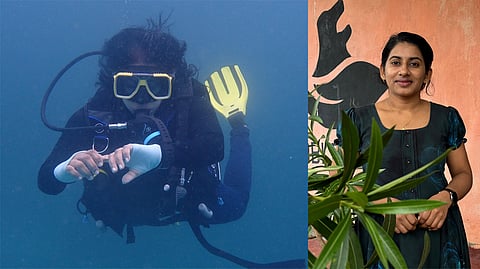

IDUKKI: Thirty two-year-old Liyona George’s diving experience during a family tour in Andaman in 2019 became a turning point in her life as it helped her get rid of her fear of deep water.
Later, she went on to become the first certified female ecological diver in India. Liyona qualified the Rebreather Association of International Divers (RAID) ecological diver course from the Marine Melodies Diving Academy in Lakshadweep.
A resident of Venmani in Idukki, Liyona had an aquaphobic past. “When I was studying in Class 4, I was accidentally swept away in the gushing waters of the Periyar river, caused as a result of the dam opening. Though I was rescued by local residents, it made me aquaphobic from my childhood,” she says.
Following her first diving experience in Andaman, Liyona wished to pursue an open water diving course, to learn diving skills. Since it was mandatory for a person to swim 200 m unaided to join an open water diving course, she joined for a swimming class in Puducherry for 15 days.
In 2022, Liyona qualified the advanced open water diving course. Later she pursued the Emergency First Response (EFR) and CPR courses from Puducherry.
“I had also qualified the deep diving, enriched air diving (nitrox diver) and underwater photography courses from the Lackadives dive centre in Andaman. Nitrox diving involves breathing a gas mixture with a higher oxygen concentration than the air we normally breathe while scuba diving. This allows divers to stay underwater longer,” she explains.
Later, upon knowing the importance of marine conservation, Liyona concentrated on ecological diving. While diving in the waters of Andaman Islands, she had high expectations. Liyona thought she was going to witness a lot of colour underwater as she had seen on the National Geographic and other travel channels on the television. But her diving experience turned out to be a heartbreaking one when she came across all white corals that were beginning to die from getting bleached.
“Rising water temperatures and climate changes are the reason for coral bleaching. Under such conditions corals will expel an algae living in their tissues and become completely white in colour,” says Liyona.
“Most people are unaware of the marine ecosystem and its pollution as it is rarely part of the climate change discourse. Being a scuba diver, I have been witnessing the extent of pollution and how it is affecting the marine ecosystem. So, the least I could do is to create awareness and to do clean-ups, which is in my capacity,” she says.
Liyona, who runs an animal rescue centre-cum-hospital named BARK Charitable Trust in Puducherry with her husband, plans to execute her conservation efforts through the centre which also aims at nature and environmental conservation along with animal rescue. “We plan to collaborate with agencies working in marine conservation,” she says. A voluntary member of the Society for the Prevention of Cruelty to Animals (SPCA) since 18, Liyona is married to Solai Rajan, a conservationist and an animal lover. The couple is settled in Puducherry.
GRAVE ENCOUNTER
While diving in the waters of Andaman Islands, she had high expectations. Liyona thought she was going to witness a lot of colour underwater as she had seen on the National Geographic and other travel channels on television. But her diving experience turned out to be a heartbreaking one when she came across all white corals that were beginning to die from getting bleached